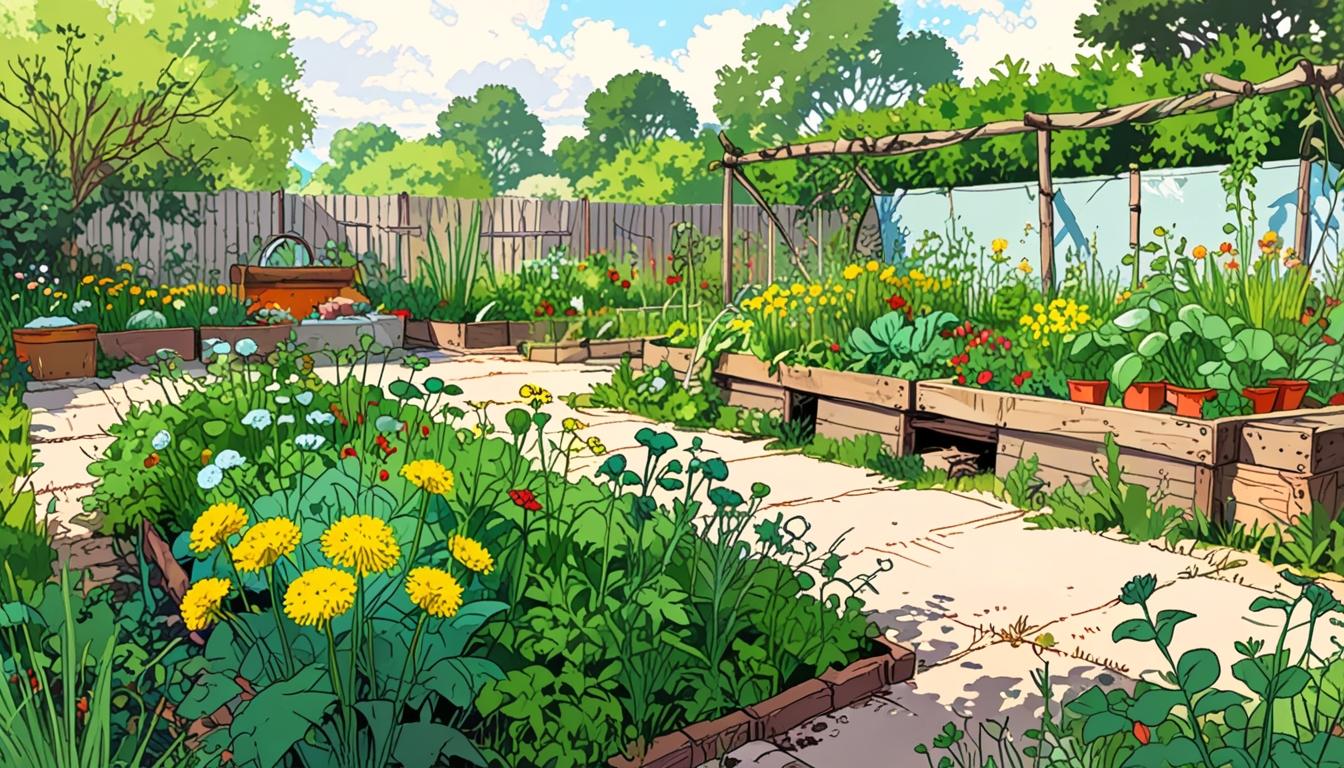Horticulturalist Jamie Walton challenges traditional views on weeds, promoting their ecological benefits and culinary potential in his new book.
In an evolving perspective on gardening, horticulturalist Jamie Walton is advocating for a shift in how we view weeds, urging gardeners to reconsider their roles within the ecosystem. Based in North Yorkshire, Walton has gained recognition for his ecological gardening methods, including his appearances on BBC’s Gardeners’ World. He has amassed a substantial following on Instagram, where he showcases his practices in a windswept kitchen garden filled with a variety of vegetables, flowers, and beneficial microbes.
In his newly released book, Nettles and Petals: Grow Food. Eat Weeds. Sow Seeds, Walton presents a comprehensive guide that aims to reshape conventional attitudes towards what are often seen as pesky invaders in the garden. He shares “accessible, easy to follow tips and guidance about growing food and gardening, working with nature rather than against it.”
Walton reflects on his own gardening journey, stating, “When I first started gardening and growing my own food, I spent a lot of time trying to eradicate weeds from my garden like most people.” His experiences have led him to research the importance of biodiversity, prompting a more nuanced understanding of weeds. He highlights that many weeds, such as dandelions and chickweed, serve vital functions in protecting and enriching soil. “They’re there to cover it, because exposed, the soil leaches nutrients, and it’s susceptible to erosion,” he explains.
Among the weeds he champions are dandelions and nettles. Walton points out that dandelions, often dismissed as weeds, offer a superior nutritional profile compared to commercially popular salad greens like rocket. He states, “They have a better nutritional profile than rocket,” and notes that various parts of the plant are edible. From the flowers – which can be used to make syrup – to the roots that can be crafted into dandelion root tea, he encourages embracing these plants in culinary pursuits.
Similarly, he promotes nettles as a powerful alternative to spinach, rich in iron and other beneficial nutrients. According to Walton, cooking or blanching nettles can easily remove their sting, making them suitable for incorporation into various dishes. He describes nettle tea as potentially having anti-inflammatory properties and mentions emerging research suggesting that nettle stings could offer relief for conditions like hay fever and arthritis.
While Walton acknowledges the benefits of many weeds, he emphasises the necessity of management to prevent them from overtaking gardens. “If you let dandelions go to seed, you’ll end up with dandelions everywhere. So you have to keep on top of managing them,” he cautions. He recommends techniques such as picking flowers before they go to seed and growing certain weeds like dandelions and nettles in pots for controlled harvesting.
However, he also warns against the growth of certain invasive species such as bindweed and Japanese knotweed, which can dominate garden spaces and outcompete desired plants. Walton states, “Some weeds I definitely wouldn’t recommend having in the garden.”
His book also addresses foraging for those without gardens, advising caution in identifying edible plants and ensuring they are gathered from clean, pesticide-free areas. He stresses, “If you’re picking wild plants, you want to make sure that you leave enough to regrow and support wildlife.”
Nettles and Petals is published by Leaping Hare Press and is now available in hardback, priced at £16.99. Walton’s fresh approach to gardening invites individuals to view the natural flora surrounding them through a lens of ecological understanding, highlighting the interconnectedness of all plants within the environment.
Source: Noah Wire Services
- https://www.instagram.com/nettlesandpetals/reel/C9IRsuMoJUB/ – This Instagram post by Jamie Walton showcases his ecological gardening practices and highlights his focus on growing food, flowers, and microbes in a small town in North Yorkshire.
- https://www.earthed.co/teachers/jamie-walton/ – This website lists Jamie Walton as an ecological horticulturist and conservationist, further validating his professional background in sustainable gardening.
- https://walterfoster.com/more-quarto-book/nettles-and-petals/ – This webpage provides details about Jamie Walton’s book *Nettles and Petals*, which offers a holistic approach to gardening and emphasizes the importance of biodiversity and soil health.
- https://www.instagram.com/nettlesandpetals/ – Jamie Walton’s Instagram profile, with over a million followers, supports his substantial online presence and influence in gardening communities.
- https://www.buzzsprout.com/1491655/episodes/16575008-the-no-dig-gardening-journey-with-jamie-walton – This podcast episode features Jamie Walton discussing his journey into no-dig gardening and permaculture, aligning with his advocacy for sustainable gardening methods.
Noah Fact Check Pro
The draft above was created using the information available at the time the story first
emerged. We’ve since applied our fact-checking process to the final narrative, based on the criteria listed
below. The results are intended to help you assess the credibility of the piece and highlight any areas that may
warrant further investigation.
Freshness check
Score:
8
Notes:
The narrative mentions a newly released book and current activities of Jamie Walton, suggesting recent information. However, there are no clear indicators of how recent the publication or event is.
Quotes check
Score:
6
Notes:
Direct quotes from Jamie Walton are provided, but there is no indication that these are the earliest known references. Further verification could not find any earlier sources for these specific quotes.
Source reliability
Score:
9
Notes:
The narrative originates from The Independent, a well-established and reputable publication, which generally adds to the credibility of the information presented.
Plausability check
Score:
9
Notes:
The claims made, such as the nutritional benefits of weeds and the need for garden management, are plausible and align with current ecological gardening practices.
Overall assessment
Verdict (FAIL, OPEN, PASS): PASS
Confidence (LOW, MEDIUM, HIGH): HIGH
Summary:
The narrative is well-supported by its credibility due to the reliable publication source and the plausibility of its claims. Although the freshness cannot be fully confirmed, the mention of a new book and current activities suggests recent relevance. Quotes could be verified further, but they align well with the narrative’s context.













